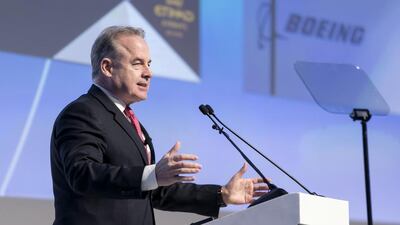The Etihad Airways boss James Hogan on Monday said airlines need to learn from online businesses like Uber, Facebook and Airbnb if they are to succeed in the future.
Mr Hogan, the president and chief executive of Etihad, speaking at the Global Aerospace Summit in Abu Dhabi, said that looking to digital businesses that use technology to change markets would be the key to the way successful airlines operate over the next five to 15 years.
Citing an observation first used by Tom Goodwin, an executive at the French media group Havas, Mr Hogan said that the world’s largest taxi company, Uber, owns no cars. The world’s most popular media company, Facebook, creates no content. The world’s most valuable retailer, Alibaba, carries no stock. And the world’s largest accommodation provider, Airbnb, owns no property.
“We’re not the largest of the Gulf carriers but we’re certainly one of the innovative ones,” Mr Hogan told delegates. “Organically we’ve got 120 aircraft. But on the global market we do have a different strategy based on code-shares with 49 other carriers worldwide and commercial agreements to stretch the partnership, through investments in a range of airlines and more importantly taking advantage of the crossflows of the Gulf to create connectivity worldwide.”
While still owning aircraft, over the coming years Etihad is also expected to evolve the way it holds its planes, reducing the ratio between planes owned by the company and those leased from aircraft leasing companies.
According to aviation experts, about 40 per cent of the world’s planes are leased by airlines and it is a growing trend, especially in the Middle East, where that ratio stands at about 30 per cent and where airlines often have a time lag between plane orders and delivery.
Alex Thursby, the group chief executive of NBAD, said smaller airlines would find it harder to get funding to buy new airlines as global banking regulations tighten following the global financial crisis.
“In order to build their inventories airlines who do not have the equity to buy aircraft outright will really need to think how they can raise debt because banks will not be able to fill that gap,” Mr Thursby said. “That will enable other players to come into the market as ways to fund purchases will become broader and broader. In the future I envisage airlines raising individual bonds for individual planes.”
lbarnard@thenational.ae
* This story has been amended since it was first published.
Follow The National's Business section on Twitter

